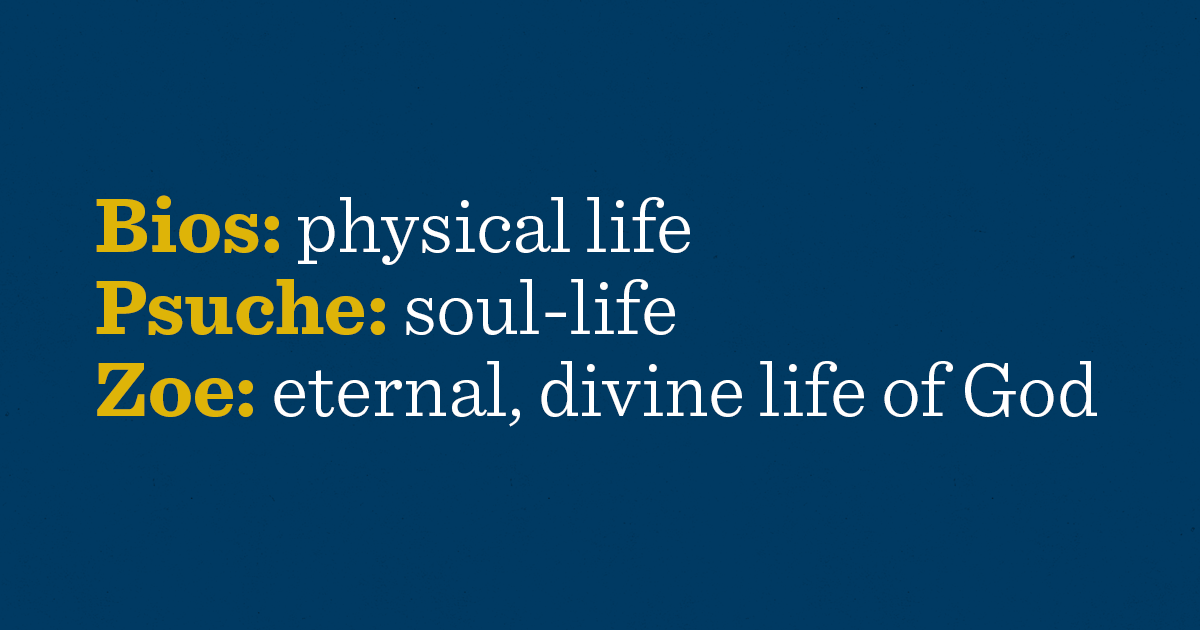3 Greek Words for Life in the New Testament and How They Apply to Us

Originally posted on the Bibles for America Blog.
The word life appears numerous times in the New Testament. But have you ever wondered what this word means? For instance, when Jesus said in John 10:10, “I have come that they may have life and may have it abundantly,” was He saying He would help us have a better life, or that He would enrich or improve our life?
The New Testament was originally written in Greek, a language richer than English in the diversity and complexity of its vocabulary. For example, there are three Greek words for life used in the New Testament: bios, psuche, and zoe. These words have different meanings, but they’re all translated into English as life. So if we want to know which meaning life has in a particular verse, we need to know which Greek word is being used.
In this post, we’ll explore the meaning of each of these three Greek words for life using verses and notes from the New Testament Recovery Version, with a special focus on zoe.
Bios, psuche, and zoe
Let’s see some examples where bios, psuche, and zoe appear in the New Testament.
1. Bios
The Greek word translated as life in Luke 8:14 is bios:
“And that which fell into the thorns, these are those who heard and, going away, are utterly choked by anxieties and riches and pleasures of this life, and do not bring any fruit to maturity.”
Bios here refers to the life of the physical body. The English word biology comes from bios.
2. Psuche
The Greek word translated as soul-life in Matthew 16:25 is psuche:
“For whoever wants to save his soul-life shall lose it; but whoever loses his soul-life for My sake shall find it.”
Most English versions of the New Testament simply use the word “life” in this verse. But the Recovery Version translates it as soul-life to refer specifically to psuche, the Greek word used here. Psuche refers to the psychological life of the human soul, that is, the mind, emotion, and will. The English word psychology comes from psuche.
3. Zoe
The Greek word translated as life in John 1:4 is zoe:
“In Him was life, and the life was the light of men.”
Zoe refers to the uncreated, eternal life of God, the divine life uniquely possessed by God.
A closer look at zoe
To take a closer look at zoe, let’s read 1 John 1:1-2:
“That which was from the beginning, which we have heard, which we have seen with our eyes, which we beheld and our hands handled, concerning the Word of life (and the life was manifested, and we have seen and testify and report to you the eternal life, which was with the Father and was manifested to us).”
The notes on these verses in the New Testament Recovery Version are of tremendous help in understanding zoe. We’ll read just a few here. Note 5 of verse 1 explains the phrase Word of life:
“This is the Word mentioned in John 1:1-4, 14, who was with God and was God in eternity before creation, who became flesh in time, and in whom is life. This Word is the divine person of Christ as an account, a definition, and an expression of all that God is. In Him is life, and He is life (John 11:25; 14:6). The phrase the Word of life in Greek indicates that the Word is life. The person is the divine life, the eternal life, which we can touch. The mentioning of the Word here indicates that this Epistle is a continuation and development of John’s Gospel (cf. John 1:1-2, 14).”
Then note 1 on verse 2 explains the connection between Word of life in verse 1 and life in verse 2:
“This indicates that life is a synonym for Word of life in the preceding verse. Both denote the divine person of Christ, who was with the Father in eternity and was manifested in time through incarnation, and whom the apostles saw and testified and reported to the believers.”
And finally, note 3 on the eternal life in verse 2 says:
“Lit., the life the eternal. This life denotes the divine spiritual life, not the human soulish life or the physical life (see note 174 in Rom. 5). Eternal denotes not only duration of time, which is everlasting, without end, but also quality, which is absolutely perfect and complete, without any shortage or defect. Such an expression emphasizes the eternal nature of the divine life, the life of the eternal God. The apostles saw this eternal life and testified and reported it to people. Their experience was not of any doctrine but of Christ, the Son of God, as the eternal life, and their testimony and preaching were not of theology or biblical knowledge but of such a solid life.”
With the help of these verses and the notes, we can see that zoe is the divine person of Christ. Christ was incarnated as the man Jesus, whom the apostles could see with their eyes and even handle with their hands. Zoe isn’t something vague; it’s the wonderful person of our dear Lord Jesus!
Having, enjoying, and living by the divine life
Now let’s revisit John 10:10, which was mentioned at the beginning of this post. Here the Greek word zoe is used for life. Let’s read it again, replacing life with zoe:
“I [Christ] have come that they may have zoe and may have zoe abundantly.”
Christ as the eternal life came so we could have the eternal, divine life. This is vastly different from thinking Christ came so that we could have a better or improved human life. He came so we could have Him, the divine life.
By our physical birth, we possess only the physical life (bios) and the soulish life (psuche). No one has the divine life (zoe) when they’re born. But when we believed in the Lord Jesus Christ as our Savior, we received Christ into us. We were born again with the divine life!
So now that we’ve received Christ, the divine life, our Christian life must be fully involved with Him. What Christ wants is for us to enjoy His life, live by His life, and let that life grow in us. Then the riches of His divine, eternal life will be expressed through us, and He will be manifested to the people all around us.
Focusing on zoe daily
When we realize that Christ’s desire is for us to have His divine, eternal, zoe life, and even have it abundantly, we’ll focus on Him enjoying Him in our spirit. We can do this by feeding on the riches in God’s Word, spending time with Christ in prayer, and experiencing Him day by day. As we enjoy the eternal life we’ve received, that life will increase within us, and little by little, we’ll express Christ in our daily life on earth.
We hope you’ve learned more about zoe. We couldn’t include all the notes on the verses mentioned in this post. But if you live in Australia, you can order a free copy of the New Testament Recovery Version to read the verses with all the enlightening commentary.
Subscribe to receive the latest posts






